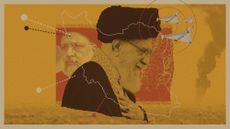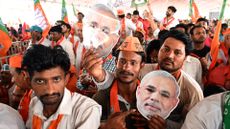How long can centrists keep the radicals at bay?
Anti-liberal radicalism is rising in the West. And the establishment has no plan to stop it.


If you're relishing a moment of political relief at the outcome of Sunday's election in France — delighted that the far-right candidate (Marine Le Pen of the National Front) came in second place behind the handsome 39-year-old centrist neoliberal technocrat Emmanuel Macron, who is overwhelmingly favored to prevail in the second round of voting on May 7 — you should go right ahead and enjoy it.
But don't let the celebration last too long.
Macron's win suggests that 2017 is unlikely to be the year that the European Union and the liberal international order are toppled by a populist insurgency, opening the way for a decidedly post-liberal age. But the political situation in the West remains extremely dire, with a rising tide of anti-liberal radicalism threatening to overwhelm the fortifications that have protected liberal democracy since the end of World War II. That reality needs to be acknowledged, confronted, and responded to with a more compelling message than the bland, unimaginative one likely to propel Macron through the second round of voting.
Subscribe to The Week
Escape your echo chamber. Get the facts behind the news, plus analysis from multiple perspectives.

Sign up for The Week's Free Newsletters
From our morning news briefing to a weekly Good News Newsletter, get the best of The Week delivered directly to your inbox.
From our morning news briefing to a weekly Good News Newsletter, get the best of The Week delivered directly to your inbox.
If you limit yourself to a fear of the far right alone, Sunday's vote provides some grounds for optimism. Marine Le Pen's father Jean-Marie Le Pen garnered 16.9 percent in the first round of voting in 2002, catapulting the National Front into the second round, where he lost in a massive landslide (82.2 percent to 17.8 percent) to Jacques Chirac of the center-right Republican Party.
Here we are 15 years later, in the season of Brexit and Donald Trump, and the younger Le Pen made it to the second round with … 21.3 percent, a whole 4.4 percentage points higher than her father's first-round result. At that rate of growth, the far right would be able to win outright in the first round of voting in the 2122 election, 105 years from now. That certainly gives the center-left and center-right plenty of time to get their acts together.
Things become somewhat less sanguine when we compare performances in the second round. If Macron beats Le Pen on May 7 by the 22-point spread predicted in the first poll since the close of the first round of voting, that would of course be a decisive defeat for the right — but it would also be one with a margin quite a bit smaller than the 64.4-point spread separating Le Pen's father from Chirac in 2002.
That's a considerable improvement that could well point to a near-term future in which the National Front (perhaps with a candidate with a different last name) continues to gain ground until it can prevail in the second round. And why should we assume that the National Front, with its long and ugly history always acting as a drag at the polls, will remain the only far-right populist vehicle on the political stage? If the rise and success of Macron has taught us anything, it's that an insurgent candidate can surge to the head of the pack in France with relative ease. If it worked for a centrist, why not a rabble rouser of the anti-globalist right?
But it's when we broaden our sights beyond the right that things becomes especially interesting — and ominous.
Le Pen wasn't the only virulently anti-liberal candidate in the first round of voting. The other was the far-left populist Jean-Luc Mélenchon, who won 19.6 percent of the vote. Put his tally together with Le Pen's and we're left with just under 41 percent of the vote going to genuine radicals.
Just how radical is Mélenchon? So radical that he would tax income above 400,000 euros (about $433,000) at a rate of 100 percent — essentially capping French salaries at under half a million euros a year. He also proposed to shorten the length of the French workweek from 35 to 32 hours, threatened to take France out of the EU and NATO, and (like Le Pen) indicated an interest in allying with Russia on the world stage. For those looking to replicate Hugo Chavez's Venezuelan miracle in France, Mélenchon is an excellent choice.
The news becomes even more worrying when we break down the vote by age cohort. Whereas Macron won easily among elderly voters (aged 70 and up), Mélenchon won the youngest voters (18-24), with Le Pen finishing in second place. Together, the far-right and far-left candidates pulled in a solid majority (51 percent) of the youth vote.
French politics are far more consistently class-based than American politics. Whereas in the U.S. the Republican and Democratic parties each have powerful elite factions as well as many working-class supporters, Macron received the bulk of his support from the wealthiest voters, leaving the populists to prevail among the poorest. (Le Pen and Mélenchon won a combined 57 percent of those with the lowest incomes.)
This would be less troubling if we thought the French economy was likely to take off in the coming years, creating jobs and raising wages for those struggling to get by. But there is no sign of such a turnaround, and none of Macron's modest proposals are likely to lead to significant improvements. French unemployment has been stuck above 10 percent for most of the past four years, and for young people it's far worse — with nearly 25 percent looking for and failing to find work. Unless this changes dramatically, the ranks of the disaffected are only going to grow.
It would be one thing if these angry and increasingly desperate voters looked to the center-left for answers and help, but they emphatically do not. In an astonishing collapse that parallels similar trends in the Netherlands, Greece, and elsewhere, the center-left Socialist Party in France is in a state of electoral free fall, with the sitting Socialist president (François Hollande) weighed down by an approval rating in the mid-single digits and the party's nominee to replace him (Benoît Hamon) finishing fifth in Sunday's vote, with an anemic 6.4 percent.
The center cannot hold. And yet it probably will on May 7, as a "Republican Front" unites to ensure the defeat of the National Front. It's a trick the French political establishment has tried before, most recently in regional elections just 18 months ago. It's always worked in the past, and it's likely to work again this time, as a majority of voters rallies around the implied no-nonsense slogan: "Neoliberalism sucks. But fascism's worse. Not complicated."
How long can a liberal democracy survive under such conditions? We don't yet know the answer. But over the coming months and years, we just may find out.
Create an account with the same email registered to your subscription to unlock access.
Sign up for Today's Best Articles in your inbox
A free daily email with the biggest news stories of the day – and the best features from TheWeek.com
Damon Linker is a senior correspondent at TheWeek.com. He is also a former contributing editor at The New Republic and the author of The Theocons and The Religious Test.
-
 Today's political cartoons - April 16, 2024
Today's political cartoons - April 16, 2024Cartoons Tuesday's cartoons - sleepyhead, little people, and more
By The Week US Published
-
 Trump criminal trial starts with rulings, reminder
Trump criminal trial starts with rulings, reminderSpeed Read The first day of his historic trial over hush money payments was mostly focused on jury selection
By Rafi Schwartz, The Week US Published
-
 Sudan on brink of collapse after a year of war
Sudan on brink of collapse after a year of warSpeed Read 18 million people face famine as the country continues its bloody downward spiral
By Peter Weber, The Week US Published
-
 Sudan on brink of collapse after a year of war
Sudan on brink of collapse after a year of warSpeed Read 18 million people face famine as the country continues its bloody downward spiral
By Peter Weber, The Week US Published
-
 How powerful is Iran?
How powerful is Iran?Today's big question Islamic republic is facing domestic dissent and 'economic peril' but has a vast military, dangerous allies and a nuclear threat
By Harriet Marsden, The Week UK Published
-
 US, Israel brace for Iran retaliatory strikes
US, Israel brace for Iran retaliatory strikesSpeed Read An Iranian attack on Israel is believed to be imminent
By Peter Weber, The Week US Published
-
 How green onions could swing South Korea's election
How green onions could swing South Korea's electionThe Explainer Country's president has fallen foul of the oldest trick in the campaign book, not knowing the price of groceries
By Sorcha Bradley, The Week UK Published
-
 Ukraine's battle to save Kharkiv from Putin's drones
Ukraine's battle to save Kharkiv from Putin's dronesThe Explainer Country's second-largest city has been under almost daily attacks since February amid claims Russia wants to make it uninhabitable
By Sorcha Bradley, The Week UK Published
-
 India elections 2024: the logistics of world's biggest vote
India elections 2024: the logistics of world's biggest voteThe Explainer More than 10% of the world's population is registered for a historic democratic exercise, with PM Modi likely to dominate again
By Harriet Marsden, The Week UK Published
-
 Erdogan set back in key regional elections
Erdogan set back in key regional electionsSpeed Read The main opposition party flipped or held Turkey's biggest cities, including Istanbul
By Peter Weber, The Week US Published
-
 Will Aukus pact survive a second Trump presidency?
Will Aukus pact survive a second Trump presidency?Today's Big Question US, UK and Australia seek to expand 'game-changer' defence partnership ahead of Republican's possible return to White House
By Sorcha Bradley, The Week UK Published